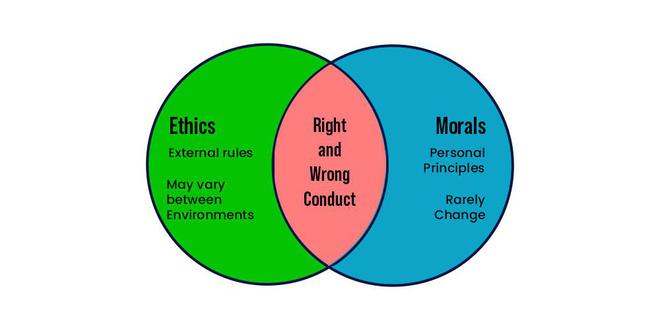Difference between ethics and Morality with examples.
Difference between ethics and Morality with examples.
What is ethic:
Ethics are a system of moral principles and the rules of conduct that arise from them. Ethics are a set of moral principles that determine right or wrong behaviour. Ethics refers to an individual’s moral beliefs or principles which govern his or her conduct. Ethics deals with right and wrong in general as well as questions about how one should act towards other people (eg., confidentiality).
What is Morality?

Relation Between Ethics And Morals
Where does Morality come from?
There are a few different schools of thought on where morality comes from. Some people believe that it is innate, something we are born with. Others believe that it is something that is learned through experience and socialization. And still, others believe that it is a combination of both nature and nurture.
Ethics vs. Morals
- Morals are what you believe, while ethics are what you do. You can have conflicting morals and ethics, like believing stealing is wrong but doing it anyway.
- Morals are often based on religion or culture, while ethics are based on logic and reason. This means that you can have different ethical systems even if you share the same morals.
- Morals usually deal with personal conduct, while ethics deal with professional conduct. For example, a doctor may consider euthanasia to be morally acceptable but ethically unacceptable because of their position as a doctor.
- It’s possible for someone to live by their moral standards without ever having any conflicts with their ethics because morality deals more with how we should behave in our day-to-day lives, while ethics looks at all actions in general – both good and bad.
Difference Between Ethics and Morality
- Ethics are a formal system of beliefs that guide our behaviour, while morality is more personal and can vary from individual to individual.
- Ethics are usually based on logical reasoning and a shared set of values, while morality is often based on gut instinct or religious beliefs.
- Ethics tend to be more objective, while morality is often subjective.
- Ethics are universal, while morality is often culture-specific.
- Ethics are transcendent; they govern all aspects of life. Morality deals with specific issues such as politics, economics, religion and family matters. When someone does something immoral, it usually relates to one of these specific areas. In contrast, ethics applies universally to every aspect of life and when someone does something unethical, it has more implications than just in one area.
- Ethics applies to groups and organizations, while morality applies to individuals. As a result, ethical practices don’t always mesh well with organizational cultures and vice versa.
- Ethics asks people to think about what they do before they act; morality asks people to examine their actions after the fact. For example, someone might have had an opportunity for an extramarital affair but resisted because it would have been unethical rather than because it would have been wrong. Or perhaps somebody might give money to charity because they believe it is the right thing to do, not because they fear eternal damnation.
- In terms of thinking through what we should do in certain situations, ethics tells us how we should behave while morality only tells us if we did the right thing once we’ve behaved in some way.
- Ethics will help you determine whether your behaviour was good or bad, while morality may help you decide whether your intentions were good or bad.
- Both ethics and morality play important roles in shaping human civilization.
Conclusion – Ethics vs Morality
Ethics and morality are related concepts concerned with distinguishing right from wrong, they have nuanced differences in terms of their scope, origin, and application. Morality is more personal and subjective, often rooted in individual values and beliefs, whereas ethics tends to be more formal, external, and context-specific. Nevertheless, both play essential roles in guiding human behavior and decision-making.
.jpeg)

0 Comments:
Post a Comment
Subscribe to Post Comments [Atom]
<< Home